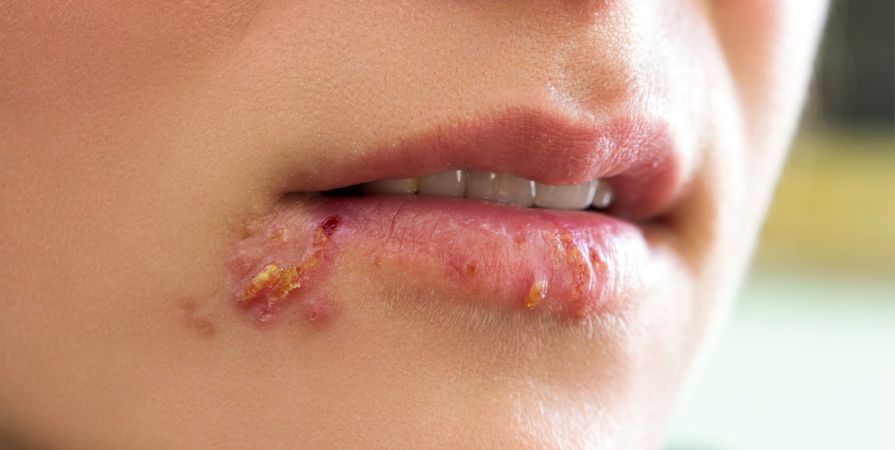Herpes Labialis

What is herpes labialis?
Herpes labialis, also known as cold sores, is a viral infection caused by the herpes simplex virus (HSV). It typically manifests as small, painful blisters on or around the lips, but can also occur on the nose, chin, or cheeks.
Is herpes labialis contagious?
Yes, herpes labialis is contagious. The virus is most easily spread when a person is experiencing an outbreak, but it can also be spread when no symptoms are present. The virus can be transmitted through direct contact with a blister or through contact with saliva or skin that has been in contact with the virus. It is also possible to contract herpes labialis through oral-genital contact with an infected person. The virus can be spread through sharing items like utensils, lip balm, or towels that may have come into contact with the virus. It is important to practice good hygiene and avoid direct contact with the blisters during an outbreak to reduce the risk of spreading the virus.
Is it common to have recurrence of herpes labialis?
Recurrences of herpes labialis are common. The frequency of outbreaks can vary greatly from person to person. Some people may experience outbreaks several times a year, while others may only have occasional outbreaks. Factors that can contribute to the frequency of recurrences include stress, exposure to sunlight, and a weakened immune system. Once a person is infected with the herpes simplex virus (HSV), the virus will remain dormant in the body and can reactivate at any time, causing outbreaks of herpes labialis.
It is important to note that many people with herpes labialis may not have recurrent outbreaks or may have very mild symptoms, so they might not even realize they have the virus.
How is herpes labialis diagnosed?
Herpes labialis is typically diagnosed based on the appearance of the blisters and the location of the outbreak. A healthcare provider will typically examine the affected area and may take a sample of fluid from a blister for laboratory testing.
The most common test for herpes labialis is a viral culture. In this test, a sample of fluid is taken from a blister and placed on a culture medium. If the herpes simplex virus (HSV) is present in the sample, it will grow in the culture medium, which confirms the diagnosis.
Another test that can be done is the PCR (polymerase chain reaction) test, which is more sensitive than the culture test. This test can detect the genetic material of the virus in a sample of fluid or tissue from a blister.
Blood test can also be done to detect the presence of antibodies against herpes simplex virus, this test is not specific for oral or genital herpes, it just detects the presence of the virus in the body.
It is important to note that a healthcare provider should always be consulted for proper diagnosis and treatment.
Is it important to take treatment for herpes labialis?
Treatment for herpes labialis can help to reduce the duration and severity of an outbreak and may also reduce the frequency of recurrences. Antiviral medications, such as acyclovir, valacyclovir, and famciclovir, are effective in treating herpes labialis. These medications work by preventing the virus from replicating and can help to speed up the healing process.
It is important to note that antiviral medication is most effective when started as soon as possible after the onset of symptoms, ideally within the first 24-48 hours. When taken during an outbreak, antiviral medications can reduce the duration of symptoms by about one day and may also reduce the severity of symptoms.
It is important to keep the affected area clean and dry and to avoid touching or picking at the blisters to prevent secondary bacterial infections.
If you have frequent recurrent herpes labialis, your doctor may suggest suppressive therapy, which is the use of antiviral medication on a daily basis to reduce the frequency of outbreaks.
Can herpes labialis spread by kissing?
Yes, herpes labialis can be spread through kissing. The herpes simplex virus (HSV) that causes herpes labialis is highly contagious and can be easily spread through direct contact with a blister or with saliva or skin that has come into contact with the virus. Kissing is a common way for the virus to be transmitted, especially if one of the people involved has an active outbreak of herpes labialis.
It is important to note that the virus can also be spread even when a person does not have visible blisters or symptoms. This is called asymptomatic shedding. This means that a person can still spread the virus even when they do not have any visible symptoms of an outbreak.
If you or your partner have active herpes labialis, it is best to avoid kissing or any oral-genital contact until the outbreak has completely healed. It’s also important to practice good hygiene and avoid sharing items that may come into contact with the virus, such as utensils, lip balm, or towel


